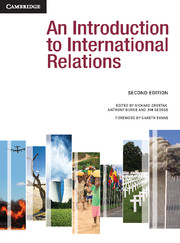Book contents
- Frontmatter
- Contents
- Tables, Figures and Boxes
- Contributors
- Preface and acknowledgements
- An Introduction to International Relations: The origins and changing agendas of a discipline
- 1 Theories of International Relations
- 2 The Traditional Agenda
- 3 The New Agenda
- 21 The United Nations
- 22 Non-State Actors: Multinational Corporations and International Non-Governmental Organisations
- 23 Religion and Secularism
- 24 Global Economic Institutions
- 25 Global Trade
- 26 Global Finance
- 27 Global Poverty, Inequality and Development
- 28 Globalisation and Its Critics
- 29 Global Terrorism
- 30 Post-Conflict State-Building
- 31 Humanitarian Intervention
- 32 Human Rights
- 33 Migration and Refugees
- 34 Global Environmental Politics
- 35 Climate Change
- Glossary of Terms
- Bibliography
- Index
- References
24 - Global Economic Institutions
from 3 - The New Agenda
- Frontmatter
- Contents
- Tables, Figures and Boxes
- Contributors
- Preface and acknowledgements
- An Introduction to International Relations: The origins and changing agendas of a discipline
- 1 Theories of International Relations
- 2 The Traditional Agenda
- 3 The New Agenda
- 21 The United Nations
- 22 Non-State Actors: Multinational Corporations and International Non-Governmental Organisations
- 23 Religion and Secularism
- 24 Global Economic Institutions
- 25 Global Trade
- 26 Global Finance
- 27 Global Poverty, Inequality and Development
- 28 Globalisation and Its Critics
- 29 Global Terrorism
- 30 Post-Conflict State-Building
- 31 Humanitarian Intervention
- 32 Human Rights
- 33 Migration and Refugees
- 34 Global Environmental Politics
- 35 Climate Change
- Glossary of Terms
- Bibliography
- Index
- References
Summary
Introduction
This chapter explores the role of three global economic institutions (GEIs) in contemporary economic governance: the International Monetary Fund (IMF), the World Bank and the World Trade Organization (WTO). As we will see there is no single vantage point from which to view these institutions or from which to assess their importance. In the first part of the chapter we discuss global governance and globalisation and examine competing perspectives on international organisations. Controversies over the role of the GEIs in the global economy have focused on the economic impact of their activities and their representative nature as institutions of governance. The second part therefore explores the historical evolution of the IMF, World Bank and WTO as they adapted to the challenges of an evolving global economy. In this section we will examine competing claims concerning their competence as economic managers. Recently, the legitimacy, accountability and representative nature of GEIs have been called into question. The final part of the chapter focuses on the debate over the democratic credentials of the GEIs.
In 2008 a financial crisis with its origins in the US spread to the rest of the world ushering in a global financial crisis with deep and profound consequences for most countries in the world. The Global Financial Crisis (GFC) of 2008–09 was the most severe experienced by credit markets since the Great Depression of the 1930s (Collyns 2008). The financial crisis in turn sparked an economic recession as economic output fell. It was apparent from the outset that individual nations could not return to economic prosperity through reliance on their own economic measures. In other words, both national and international action was necessary to repair the damage wrought by the GFC. Under these circumstances forms of global regulation and management came under intense scrutiny and the focus turned to the key institutions of global economic management with many commentators debating the relevance of the Bretton Woods institutions (the IMF and World Bank) to the twenty-first century economic landscape (Boughton 2009; Pisani-Ferry and Santos 2009). One major innovation in the area of global governance was the rise of the Group of 20 (G20), and while the implications of the shift from the G8 to the G20 certainly marks an important evolution in the institutionalisation of global economic governance (Beeson and Bell 2009; Helleiner and Pagliari 2009), the global economic crisis served to highlight the continuing relevance of the Bretton Woods institutions and the WTO to contemporary global governance. This chapter focuses on the World Bank, IMF and WTO – arguably, the most important GEIs in contemporary world politics. In order to understand the activities of these institutions and the controversies surrounding them it is necessary to look at both their historical evolution and the various ways in which writers analyse international organisations.
- Type
- Chapter
- Information
- An Introduction to International Relations , pp. 336 - 347Publisher: Cambridge University PressPrint publication year: 2011



